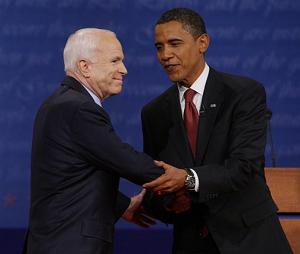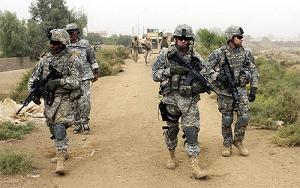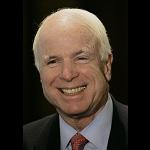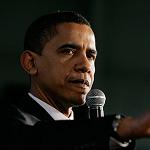
The Candidates 2008 and Foreign Policy
The election is almost here, but the dramatic increase in chatter, talking points, shrill accusations, mudslinging, and potential October surprises is not going to stop me from my attempt to shine an intellectually honest light on these campaigns. As I approach my final subject for this election season, I want to stress that I make no claims that I am unbiased; anybody who says they’re unbiased about politics is a big, fat liar. What I am trying to do is look past preconceptions, idiotic debates about pigs with lipstick and flag pins, the implications of ridiculously awful political ads, the influence of the twenty-four hour news cycle, and the affirmations of humorists, comedians, and Hollywood movie stars.
 | | Obama attempting to twist McCain's arm into giving him the election |
My goal is to take a specific subject, explore how I personally feel about it, and then find out what each presidential candidate wants to do about it. From there, I will make my ultimate decision about whom to vote for, and I will not base it solely on my partisan leanings or gut reactions. I don’t expect many people to agree with my final analysis, especially since I’ve come to the conclusion during this exercise that neither candidate is a bastard or will destroy the world as we know it. I hate the politics of hatred, and this year, both sides are taking it too far. I refuse to follow suit with a laundry list of reasons to hate the other guy; it is my hope we can all find reasons to vote for a candidate, rather than against one.
So with that in mind, I’m going to tackle foreign policy, possibly the most polar of modern political issues. Those who’ve been reading my rants since late 2002 know that, for the most part, I have supported the Bush Doctrine and the invasion of both Afghanistan and Iraq. They should also know how strongly I feel about the U.N. Security Council. But as I’ve been out of the loop for a few years now, it is necessary for me to reevaluate my positions in the light of recent history. As I am not a politician, I am perfectly capable of changing my mind if I so choose, and if you’ve got a problem with that, too bad.
I do know that, despite a certain lackadaisical attitude on behalf of the American public and its lack of a spotlight this election season, terrorism is still a problem; Al Qaeda is still out there and is still drawing its plans against us. I also know that this debate goes beyond just what Bush did. McCain is not Bush, no matter how hard Obama tries to paint them together, and I will not let this debate get mired in accusations directed at a president who has less than a hundred days left in office. Many of us put American flags and “Never Forget” stickers on our cars on September 12, but those declarations of pride and solidarity were taken down long ago, leaving us back where we started: bickering like fools with an enemy who couldn’t possibly care any less whether you’re a Republican or Democrat. I don’t think it’s paranoia to have a conversation about terrorism in the world today, nor do I think it’s jingoistic to say I’m proud of my American heritage.
Having said that, of course, it can go too far. If we were to close our borders, shred our international alliances, and declare war on anybody who looks at us funny, we will lose everything that makes this a great country. America does seem to have an image problem—along with a psychological one—and we can’t get beyond that until we find a middle ground of our own. We’re supposed to be the United States, not the Blue and Red States. Certainly we can be bigoted; we can be arrogant; we can be stupid; we can be crass; we can even be idiotic. But damn it, we are America—we are the best country in the world—and we’re supposed to stand as a beacon for freedom, tolerance, and other grand ideals. We can’t let that be destroyed by threats both foreign and domestic, nor can we destroy what we stand for in the name of security.
Iraq and Afghanistan
 | | These guys aren't bumbling idiots, and whether you believe it or not, they are defending you |
Yes, I support the war in Iraq, and I have since the beginning. Yes, mistakes were definitely made when we got there, but that doesn’t change the situation. Leaving now with our tails tucked between our legs is a terrible idea, as is writing down a timetable that gives the enemy a date to mark on their calendars. The surge is definitely working, and my ideal candidate is one who wants to get the job done before we start talking about bringing the troops home. The men and women of our military were not conscripted, so I’m not swayed by arguments about how these poor volunteers and their families have to deal with the war—they signed up for it. They also seem to know that leaving before we’ve secured the country and made a firm ally only ensures that we’ll have to go back when it all falls apart again.
The situation in Afghanistan is similar, but clearly not the same. Like Iraq, our mismanagement of a past situation lead directly to current events, and like Iraq, Afghanistan is a fight we can’t walk away from. However, the war in Afghanistan doesn’t get nearly as much press as Iraq and, as should be a surprise to most of us, we aren’t really winning the war in Afghanistan. The Taliban is completely reconstituted and preparing a counter-attack across the Pakistan border. Taking troops out of Afghanistan—even if its to reinforce troops elsewhere—would be more disastrous than taking them out of Iraq. It’s only a matter of time before the situation in Afghanistan becomes a new conflagration, so my ideal candidate would be one with an aggressive plan to prevent that inevitability and take out the Taliban once and for all.
John McCain, a veteran, seems to understand the situation in Iraq. He refuses to talk about timetables or pullouts, and he insists that the surge needs more time to secure the country. He claims that it is more than a political position for him, as he has vocally pronounced that he’d rather lose the election than a war and that he’d be more than willing to be the last man standing in support of the war in Iraq. However, when it comes to Afghanistan, he is pretty quiet; his website barely mentions it and the only time he seems to talk about it is in reference to Obama’s quip about sending troops to attack an uncooperative Pakistan. While I agree that sending troops into Pakistan is probably the worst foreign policy idea I’ve heard in a long time, I still think McCain needs to be clearer on his plan for Afghanistan. He has at least said that he doesn’t want to take troops out of the region.
 | | Halabja 1988: if that's not a human rights violation, I don't know what is |
Barack Obama, when he talks about Iraq, talks about it as an unmitigated failure. The guy who has thus far proposed spending ludicrous amounts of money to solve all of America’s domestic woes is talking about how expensive the war in Iraq is. He talks about the mistakes of the war—and has a few valid points—but he has no plan to fix those mistakes aside from a scheduled full troop pullout within 16 months (a plan he has since changed to a scheduled troop reduction without comment). He also doesn’t support the surge and continues to consider it a failure, despite overwhelming evidence to the contrary, because it “hasn’t offered a political solution.” When it comes to Afghanistan, though, he is proposing an increase in troops and military spending. He also wants to send troops to Pakistan. And as a side note, he has defined the “Obama Doctrine” as having a moral interest in using whatever means—even military ones—to stop human rights violations around the world, even if there are no national security interests involved, and yet he has a problem with us going into Iraq!
I give Obama credit when it comes to Afghanistan, but I find his take on Iraq deplorable and stupid. Iraq is not a failure, nor was it a bad idea, but bringing the troops home now will ensure that it becomes both. Since I don’t believe McCain will abandon Afghanistan or ignore it once in office, I therefore give this round to McCain (I also defer to his much greater experience with war). We need to see the Iraq war to its conclusion if we want to have any hope of reducing the threat posed by militant Islam, no matter how unpopular the war is with the fickle public or the mainstream media.
The War on Terror
Catching Osama bin Laden shouldn’t be the primary objective in the so-called War on Terror (I still hate that name), but it is pretty important and would be a symbolic victory in many ways. I don’t honestly know if we’re winning this “war,” but I think our strategy is sound, as long as we see it through to something resembling an end. Of course, it isn’t possible to eradicate terrorism or even militant Islam, but if we are sincere in our efforts to reduce their effectiveness, we have to apply the impossible as a goal; we can’t touch the stars, but we must reach for them.
And while I have no real problems with the USA Patriot Act (I’ve actually read the whole thing and applied its changes to statutory law), I am not averse to finding better ways to secure individual rights without compromising national security. Also, I do have problems with Guantanamo Bay (though waterboarding isn’t one of them) and hope for more transparency in what’s going on over there. My ideal candidate wouldn’t ignore these concerns, but would stop short of advocating returning us to where we were before September 11.
 | | Prisoners at Guantanamo |
McCain said during a primary debate last year that he would follow Osama bin Laden “to the gates of Hell” in order to catch him, that while catching him isn’t the only goal of the War on Terror, it is one of the biggest. He has advocated using more “human intelligence” to catch the man, as well as “smart, tough spies.” He has repeatedly talked about the threats posed by militant Islamic extremism and called the War on Terror “a fight between right and wrong, good and evil,” a war “we must fight.” He has proposed closing the Guantanamo Bay prison altogether and sending its residents to Fort Leavenworth. However, he strongly disapproved of the Supreme Court decision to establish habeas corpus for Guantanamo detainees, falsly claiming that it caused thirty released prisoners to attack U.S. interests. He also voted to reauthorize the USA Patriot Act, though his votes surrounding specific amendments and aspects of the act are an even mix of yeses and nos.
Interestingly, Obama also voted to reauthorize the USA Patriot Act, and has gone on record saying, “As a nation we have to find the right balance between privacy and security, between executive authority to face threats and uncontrolled power. What protects us are the procedures we put in place to protect that balance, namely judicial warrants and congressional review. These are concrete safeguards to make sure surveillance hasn't gone too far.” He has also said that we should “strengthen and improve intelligence capabilities. We must reform our domestic intelligence capabilities in a manner that balances the risks of impeding on the civil liberties of our citizens and increase international cooperation on all fronts. We should also give the Director of Intelligence the authority he or she needs over budget and personnel to be effective and accountable.” Obama wants to close down Guantanamo as well, and he strongly supported restoring habeas corpus to its prisoners. And of course, Obama wants to get Osama bin Laden at all costs, even if we have to make a sworn enemy of Pakistan to do it.
It’s that last part that bothers me about Obama’s take, but as for the rest of it, he sounds perfectly reasonable. I’m on board with both of those quotes in the above paragraph. He isn’t any weaker on the issues than McCain, and he seems to be in agreement with nearly everything here. I still lean towards McCain on the whole not sending troops into Pakistan without approval thing, but I want to admit that I think restoring habeas corpus to Guantanamo detainees is a good idea, even if it risks letting a few terrorists go. Let’s face it, we’re not going to stop watching them, and if we project an image of fairness in the face of our fears, we’re being America. So, I’m willing to give both candidates a win on this topic, for two different reasons.
Iran, North Korea, and Other Potential Threats
Of course, Iraq and Afghanistan are not the only threats in these unstable times. Iran’s nuclear ambitions and hostile attitude are extremely dangerous, and it would be idiotic to ignore them. As we have seen time and time again, U.N. sanctions are ineffective without some muscle behind them, so I don’t think shaking our military might in the face of dictators and hostile regimes should ever be off the table. As for diplomacy, it is always a useful tool, but sitting down with someone like Kim Jong Il without any preconditions is ridiculously naïve. I do think it is important to have a good international image and good international relations, but it is more important to do the right thing, even if it is unpopular. If the international community disagrees with what we want to do, and what we want to do is the right thing to do, it shouldn’t matter, and that’s why I disagree with anyone who wants to hand over an ounce of our sovereignty to an organization like the U.N. Security Council. Besides, if what we do is ultimately the right thing to do, history will be our judge, not political blowhards and bureaucrats. Therefore, while my ideal candidate would be one who talks about building international relations, he is also one who keeps our image just shifty-eyed enough to make the bad guys nervous.
The Libertarian Perspective
Okay, when it comes to foreign policy, Bob Barr—like most hardcore Libertarians—is completely insane. He wants to pull out of Iraq and Afghanistan, wants the military to be used only for tangible defense with a strict non-interference mandate, regrets voting for the USA Patriot Act (which he wants to repeal), and sponsored a bill allowing for the strategic assassination of terrorist leaders (in January 2001). He doesn’t want to make any new anti-terrorism laws, doesn’t believe America can ever be an occupying power, and in 1995, proposed moving the U.S. Embassy to Jerusalem.
 If you want us to lose the War on Terror on every possible front, vote Bob Barr. Otherwise, please—for the love of God—vote for somebody else. If you want us to lose the War on Terror on every possible front, vote Bob Barr. Otherwise, please—for the love of God—vote for somebody else.
|
McCain clearly sees Iran as a threat to world security. He has proposed a League of Democracies (which sounds uncomfortably similar to the League of Nations) that can wield more effective economic power than the U.N. and refuses to take any military option off the table. He is fine with using diplomacy, but he demands that there be preconditions to all negotiations. Despite his criticism of Obama for proposing a military option in Pakistan, McCain won’t take that off the table either, though he admits he would need more motivation than the possibility of finding bin Laden. When it comes to other rogue states like North Korea, Libya, and Syria, McCain has said he would “arm, train, equip, both from without and from within, forces that would eventually overthrow the governments and install free and democratically elected governments.”
Obama, who wants to double foreign aid spending to a whopping $50 billion a year by 2012, can’t seem to talk about foreign policy without talking about how awful President Bush was at it. Apparently, the whole of Obama’s foreign policy platform is “I’m not Bush.” He says U.S. policy should “promote democracy and human rights,” that we should meet with enemy leaders even if there are no preconditions, and that the main goal of foreign policy is to “win the hearts and minds” of the world. He talks about using the military to take care of human rights violators the world over, but he is critical of Bush’s policy of using the military to take care of human rights violators the world over.
Obviously, McCain wins this round without problem. While his proposed League of Democracies and his willingness to arm and train outsiders (the way we trained bin Laden to tackle the Russians) does make me a little nervous, Obama’s across-the-spectrum proposals of spending more money on foreign aid, sitting down with dictators without setting preconditions, and trying to win over the international community before trying to do the right thing make me downright afraid. Still, I’d vote for McCain rather than against Obama, because McCain seems to have the right balance of using diplomacy, intelligence, and the military, while refusing to take any option off the table.
My Choice if Foreign Policy were the Only Relevant Issue
  |
| The Candidates and Foreign Policy |
  |
|
While the past few installments have surprised me, this one should come as no surprise. Of course I’d vote McCain if foreign policy were the only relevant issue. He has far more experience and understanding in these matters, and he doesn’t seem to be trying to play catch-up with his opponent. He may go a little more hard-line than I’d like on issues like Guantanamo Bay and training foreign armies to take down the enemy, but despite what the Obama ads would have us believe, he is not as extreme as the sitting president.
The bottom line here is that I’d trust McCain, not only as my Commander-in-Chief, but also as the guy negotiating our place in the world. I think he has a clear and strong head on his shoulders, and I don’t think he’d bend over to international pressure unless it were the correct strategy. Obama, on the other hand, seems to offer nothing but rhetoric, most of it the same virulent anti-Bush nonsense that cost John Kerry the last election. While I don’t think Obama would ruin this country, I wouldn’t be comfortable with him asking the U.N. Security Council for anything or with how he’d handle the likes of Mahmoud Ahmadinejad getting his hands on a nuclear arsenal.
Still, while I think he’s as wrong as he could possibly be when it comes to Iraq, I think he’s got the right idea with Afghanistan and the domestic side of the War on Terror. He’s not a complete moron when it comes to foreign policy, but I’d just feel safer with John McCain.
If you disagree with me (or even if you agree), feel free to add comments below. Otherwise, check back in three weeks when I’ll finish up this exercise with a complete review.
-e. magill, 10/13/2008
|
|